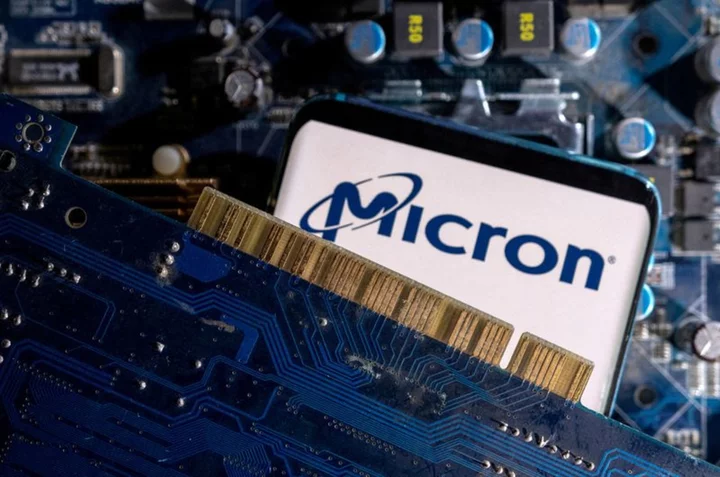By Joyce Lee
SEOUL (Reuters) -China's ban on the use of U.S.-based Micron Technology's chips in certain sectors, announced on Sunday, is a stark reminder of risks facing the global chip industry as it braces for escalating Sino-U.S. trade tensions.
China's move against Micron, the biggest U.S. memory chipmaker, was widely seen as retaliation for Washington's efforts to restrict Beijing's access to key technology. It came just a day after the Group of Seven (G7) rich nations agreed they would look to "de-risk, not decouple" from China, and as Washington pressures its allies to join it in restricting chip equipment exports to China.
Micron, which makes DRAM and NAND flash memory chips, is the first U.S. chipmaker to be targeted by Beijing after Washington over the past year unveiled a series of export controls to block certain chips and chipmaking technologies being used to advance China's military capabilities.
While the move could benefit Micron's key rivals - South Korea's Samsung Electronics and SK Hynix - in the near term, analysts said the growing geopolitical tensions cast a shadow over the industry as firms need to navigate rising uncertainties that could impact investment and supply chain management.
Such tit-for-tat policies will make investment decisions difficult for all chipmakers, said Kim Sun-woo, analyst at Meritz Securities in Seoul. "Companies have to address both production and sales. It would be better if production and sales happened in the same place, but this will keep dividing the two sides," he said.
Just days before the ban, Micron announced a plan to invest up to 500 billion yen ($3.7 billion) in Japan in extreme ultraviolet technology, becoming the first chipmaker to bring the advanced chipmaking technology to Japan. Tokyo is striving to reinvigorate its chip sector, while the United States is increasingly urging its allies to work together to counter China's chips and advanced technology development.
Micron, which generated around 11% of its revenue from chip sales in mainland China in the last fiscal year, said it looks forward to continuing to engage in discussions with Chinese authorities, without commenting on whether Beijing's decision might also affect the company's investment plans for Japan in any way.
"It takes huge amounts of pre-emptive investment to be a chipmaker, and it takes five years, 10 years to break even on those investments, so putting predictability into jeopardy makes investments difficult," said Changhan Lee, vice chair of the Korea Semiconductor Industry Association.
"In the long term, this won't help anybody."
STUCK IN THE MIDDLE
Although chip factories' costs vary according to capacity, chip type and country, the industry is one of the most capital-intensive manufacturing sectors, requiring construction of clean rooms and purchase of sophisticated chip manufacturing tools. Samsung, for example, spent a total of about 60 trillion won ($45.4 billion) to build two of its chip plants in Pyeongtaek, South Korea.
In China, Samsung and SK Hynix, the world's No.1 and No.2 memory chipmakers, have invested billions of dollars in their chip factories, which import some equipment such as etching machines from the United States. When Washington announced restrictions on chipmaking exports to China last October, it issued a one-year waiver for Samsung and SK Hynix so they can import tools without having to apply for a license, but whether that waiver will be extended is not clear.
"It's better to set up the most efficient production base considering fixed costs and wages, but a big variable called regulation has been added. It's more complicated," Kim at Meritz said.
Analysts recommended accepting the rounds of Sino-U.S. trade war as status quo, while roundabout ways of importing memory chips may emerge in response to any further geopolitical pressure.
The White House asked South Korea to urge its chipmakers, the world's biggest memory-chip producers, not to fill any market gap in China if the sale of Micron products were restricted, according to a report by the Financial Times last month.
"(Korean chipmakers) are stuck in the middle and being bothered by all sides," said Kim at Meritz.
Both Samsung and SK Hynix had no comment.
"The U.S.-China hegemony war is here to stay," said Lee Min-hee, an analyst at BNK Investment & Securities.
"Now it's chips, later it will be rare earths, raw materials... This is going to continue."
($1 = 1,320.9300 won)
(Reporting by Joyce Lee in Seoul and Josh Ye in Hong Kong; Editing by Miyoung Kim and Susan Fenton)









